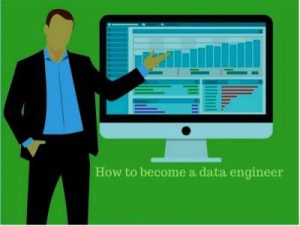In today’s world, organizations and businesses are controlled by data. From market trends to product popularity, brand recognition, and clientele, everything can be analyzed to come up with a comprehensive action plan for these organizations. To access, sort, and analyze data, all organization need a seamless system of data collection and compilation.

This is why, we see an ever increasing demand for data engineers. Therefore knowing how to become one is critical.
Data Engineer and Data Scientist Are Not the Same
Before we go any further, let’s make it clear.
A data engineer and a data scientist are not the same. It’s true that the job descriptions of both roles include the handling of big data for the organization’s benefit, but the data engineer is responsible for developing an infrastructure or a system for the collection of this data, while a data scientist uses advanced mathematical and statistical principles to create models and analyze this data and to predict future market and industry trends.
Now, moving on to the issue at hand i.e. how to be a data engineer?
There is no hard and fast rule or path to follow for a data engineer. The important part is that anyone aspiring to become a data engineer has the required knowledge and skills.
The Required Knowledge and Skills
With an increase in the demand for data engineers, there is an equally high number of data engineers in the market to match this demand. What sets the average data engineer apart from the exceptional one is the possession of the following skills and knowledge:
• Understanding of the components and tools of data architecture
• Knowledge of database solutions like SQL
• Data warehousing solutions and ETL tools
• Hadoop based Analytics
• Knowledge of the different coding languages
• Basic understanding of mathematics, modeling, and statistical principles
• Understanding of the different operating systems
These skills and knowledge can be acquired by a number of different sources. These include getting an undergraduate or graduate degree in computer science or software engineering, enrolling in online courseware, pursuing professional certifications, and acquiring professional experience.
Get a Degree
For many jobs and positions as a data engineer, organizations require the applicants to have a relevant degree or a diploma. Therefore, the most obvious course of action is to enroll in a university offered bachelors or masters program in computer science or software engineering.
These degrees often have a well-rounded course content that allows the student to acquire all of the skills and knowledge required to become a data engineer. Alternatively, a person can also pursue a diploma course. These are usually shorter and offer a much more specialized approach to the course contents. The drawback is that they don’t provide as in-depth a knowledge and understanding as those provided in a regular degree.
Pursue Professional Certifications
With the huge resource of online courses and professional certifications available both online and in real life, it is now easier than ever for aspiring data engineers to hone their skills further, learn about the latest innovations in the ever-evolving world of technology, understand how to use technology and the many tools it provides to work far more efficiently and to increase their marketability for the potential employers.
Gain Industry Exposure and Professional Experience
Understanding and knowledge are one thing, but getting hands-on experience is an altogether different ball-game. Once you have the required qualifications and certification, it is time to get your hands dirty. Professional experience allows the data engineer to apply their skills and knowledge and to observe and analyze the outcomes. This way, by seeing the theories and principles in action, they can learn to modify and adapt their knowledge to different scenarios and tackle real-world problems.